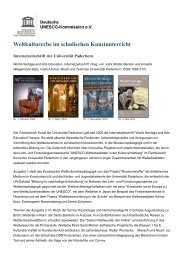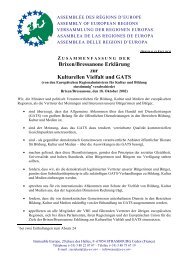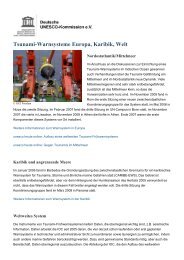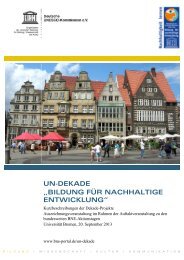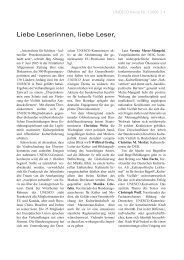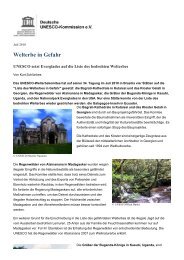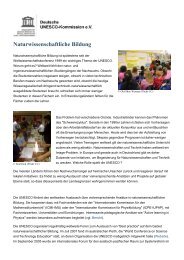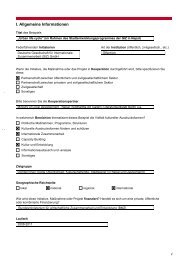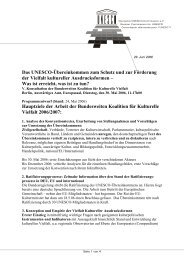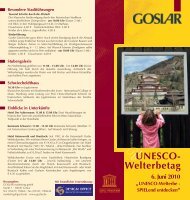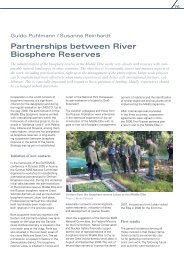For life, for the future Biosphere reserves and climate change
For life, for the future Biosphere reserves and climate change
For life, for the future Biosphere reserves and climate change
Create successful ePaper yourself
Turn your PDF publications into a flip-book with our unique Google optimized e-Paper software.
fast, we also have to act wisely <strong>and</strong><br />
sensitively to sites <strong>and</strong> local conditions.<br />
We already have considerable<br />
experiences, such as minimizing<br />
impact of wind energy on birds or<br />
bats. However, much more needs to be<br />
discovered on how we can reconcile<br />
ambitious measures of <strong>climate</strong> <strong>change</strong><br />
mitigation <strong>and</strong> adaptation with o<strong>the</strong>r<br />
challenges to sustainable development.<br />
In <strong>the</strong> end, sustainable development<br />
is much more than reducing GHG<br />
emissions to long-term acceptable<br />
measures.<br />
This is where UNESCO biosphere<br />
<strong>reserves</strong> come into play. As “model<br />
regions <strong>for</strong> sustainable development”<br />
<strong>the</strong>y have successfully defined many<br />
recipes on safeguarding livelihoods<br />
in rural communities, on combining<br />
sustainable economies with biodiversity<br />
conservation, on coping with<br />
demographic <strong>change</strong>. Now, 40 years<br />
after <strong>the</strong> foundation of MAB, <strong>climate</strong><br />
<strong>change</strong> clearly is ano<strong>the</strong>r challenge<br />
that has to be addressed, with priority,<br />
in <strong>and</strong> by biosphere <strong>reserves</strong>. The<br />
Madrid Action Plan has stated this<br />
clearly. A recent survey has shown<br />
many impressive examples from<br />
current <strong>climate</strong> <strong>change</strong> action taken<br />
in biosphere <strong>reserves</strong> in Costa Rica,<br />
in Spain, in Korea, in Germany <strong>and</strong><br />
many o<strong>the</strong>r countries. The Dresden<br />
Declaration which has been passed<br />
by <strong>the</strong> participants of <strong>the</strong> anniversary<br />
conference in June 2011 states clearly<br />
what has to be done next. We are<br />
looking <strong>for</strong>ward to <strong>the</strong> endorsement of<br />
this declaration by <strong>the</strong> UNESCO General<br />
Conference in November. There<br />
still is a lot to be done, in Germany<br />
<strong>and</strong> around <strong>the</strong> world.<br />
Germany will remain committed to<br />
using <strong>the</strong> UNESCO biosphere <strong>reserves</strong><br />
<strong>and</strong> <strong>the</strong> MAB programme as ideal instruments<br />
to act on <strong>climate</strong> <strong>change</strong>.<br />
In closing, I would like to thank <strong>the</strong><br />
Director General of UNESCO <strong>and</strong> <strong>the</strong><br />
global MAB community <strong>for</strong> having<br />
accepted <strong>the</strong> invitation to come to<br />
Dresden. I thank every individual<br />
around <strong>the</strong> world who has contributed<br />
during <strong>the</strong> last 40 years to making <strong>the</strong><br />
MAB Programme <strong>the</strong> firm success<br />
it is today. Toge<strong>the</strong>r, through close<br />
cooperation within <strong>the</strong> global MAB<br />
community we will continue to build<br />
on this success. On behalf of <strong>the</strong> German<br />
government, let me emphasize<br />
that I am looking <strong>for</strong>ward to fur<strong>the</strong>r<br />
<strong>and</strong> even improved cooperation within<br />
<strong>the</strong> UNESCO MAB Programme.<br />
Martin Waldhausen is chairman of <strong>the</strong><br />
German MAB national committee<br />
5




